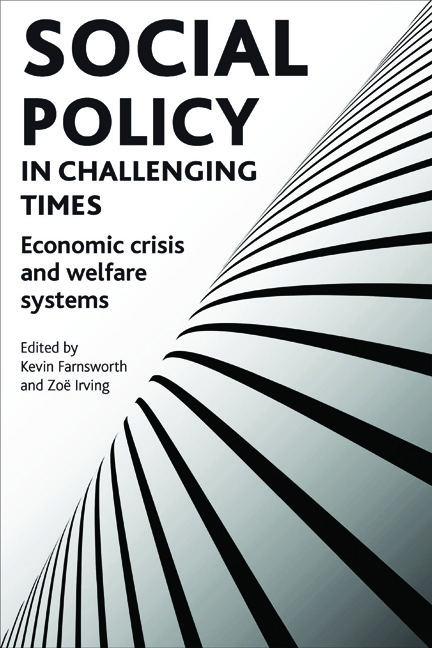Book contents
- Frontmatter
- Contents
- List of figures and tables
- Notes on contributors
- Acknowledgements
- one Varieties of crisis
- two The economic crisis and paradigm change
- three From financial crisis to fiscal crisis
- four Credit crunch, inequality and social policy
- five Global social policy responses to the economic crisis
- six Poverty, the crisis and social policy responses developing countries in developing countries
- seven South Korea after the 1997 economic crisis: a ‘paradigm shift’?
- eight China's response to crisis: what role for social policy?
- nine Tiptoeing through crisis? Re-evaluating the German social model in light of the global recession
- ten Ireland and the impact of the economic crisis: upholding the dominant policy paradigm
- eleven Waving not drowning: Iceland, kreppan and alternative social policy futures
- twelve Experiences from two financial crises in the Nordic welfare states: 1990-93 and 2008-10 compared
- thirteen Social policy and the recent economic crisis in Canada and the United States
- fourteen From economic crisis to a new age of austerity: the UK
- fifteen Responding to the challenges: some concluding remarks on welfare futures in changed circumstances
- Bibliography
- Index
two - The economic crisis and paradigm change
Published online by Cambridge University Press: 07 September 2022
- Frontmatter
- Contents
- List of figures and tables
- Notes on contributors
- Acknowledgements
- one Varieties of crisis
- two The economic crisis and paradigm change
- three From financial crisis to fiscal crisis
- four Credit crunch, inequality and social policy
- five Global social policy responses to the economic crisis
- six Poverty, the crisis and social policy responses developing countries in developing countries
- seven South Korea after the 1997 economic crisis: a ‘paradigm shift’?
- eight China's response to crisis: what role for social policy?
- nine Tiptoeing through crisis? Re-evaluating the German social model in light of the global recession
- ten Ireland and the impact of the economic crisis: upholding the dominant policy paradigm
- eleven Waving not drowning: Iceland, kreppan and alternative social policy futures
- twelve Experiences from two financial crises in the Nordic welfare states: 1990-93 and 2008-10 compared
- thirteen Social policy and the recent economic crisis in Canada and the United States
- fourteen From economic crisis to a new age of austerity: the UK
- fifteen Responding to the challenges: some concluding remarks on welfare futures in changed circumstances
- Bibliography
- Index
Summary
Introduction
This chapter will explore the politics of the response to the contemporary economic crisis in terms of Peter Hall's (1986, 1992) analysis of the significance of paradigm shifts for the explanation of policy change. Hall applied that approach to the analysis of the replacement of Keynesianism by monetarism in the 1970s. The obvious question now is: are we seeing, or likely to see, another shift, a reversal of that shift or indeed some new shift in the dominant approach to the management of the economy. Hall himself, in a comment for a news magazine, spoke of the crisis as ‘bringing to an end the infatuation with market competition that gripped Europe and America in the wake of the economic crisis of the 1970s’ but, without using the term ‘paradigm shift’, went on to speak of the waning of ‘enthusiasm for market competition’ in Europe (Huffington Post, 13 October 2008).
Care is needed both with the notion of ‘paradigm’ shift and with the concept of a ‘crisis’. The word ‘crisis’ is used widely in popular discussions of economic and political problems. Indeed, it is one of those words like ‘tragedy’ that are ever on the tongues of journalists. The Chambers Dictionary defines a crisis as ‘a crucial or decisive moment; a turning point’. So questions must be raised about whether we are really at a crucial turning point. But then there still remains a question about the extent to which such turning is likely to occur. There is a certain tendency, to which observers of economic problems of a radical frame of mind are prone, to see evidence of problems within capitalist economies as symptoms of an emergent crisis that will lead to a transformation of the existing order. Since economies are characterised by recurrent booms and slumps, there are difficulties in determining whether particular events are exceptional (a problem that has long generated pitfalls for Marxist-type analysis).
There is a related issue here about the terms used to describe an economic crisis. Hence, the contemporary crisis is alternatively labelled:
• a ‘credit crunch’, implying a very temporary disjunction;
• a ‘recession’, often given an entirely arbitrary definition among economists of two or more quarters of negative growth; or
• a ‘depression’, implying a deep and longlasting setback to the economy (note, for example, the title of Krugman’s, 2008, book The Return of Depression Economics).
- Type
- Chapter
- Information
- Social Policy in Challenging TimesEconomic Crisis and Welfare Systems, pp. 31 - 48Publisher: Bristol University PressPrint publication year: 2011



